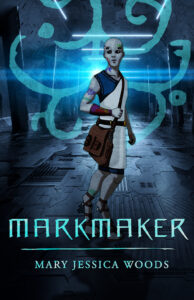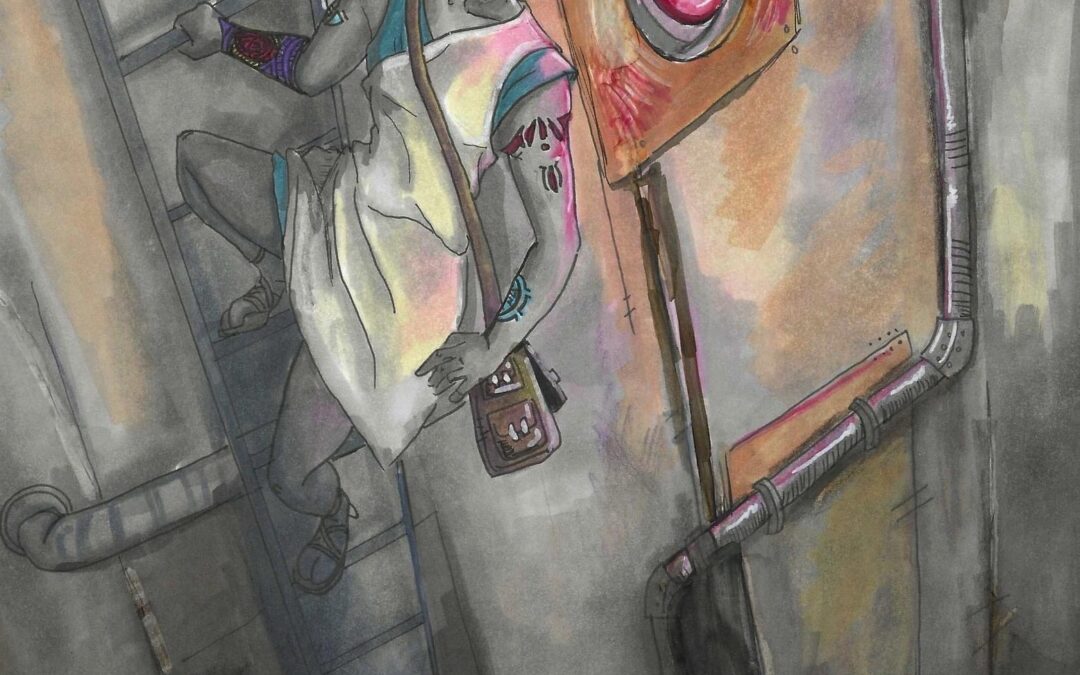Mariikel descends into the Underbelly. Image Credit: Monica Chenet
Guest post by Michael Ullo
My wife Karen Ullo is co-founding editor of Chrism Press, an imprint dedicated to publishing Catholic and Orthodox fiction. One afternoon, she was delighted to tell me that Chrism acquired a science fiction novel named Markmaker by Mary Jessica Woods. Intrigued by Chrism’s foray into science fiction, I volunteered to review the novel when it came out.
Markmaker is the story of a skilled tattoo artist or “markmaker” named Mariikel, who comes from a race of aliens called the Noxxiin, known for the marks of “truth” on their skin. As a markmaker, Mariikel is a member of an almost priestly caste, training all his life to paint symbols of ancestry, honor, and legal privilege that serve much like sacraments for his culture. Mariikel experiences a crisis, however, when he finds out that he unknowingly marked an exile for a crime he did not commit.
The exiles are the outcasts of this society, banished to the foul-smelling Underbelly of the Noxxiin’s giant ship. They live cut off from the rest of society in squalor and starvation. To atone for the sin of marking the innocent man, Mariikel commits even greater crimes, secretly traveling into the Underbelly to give unlawful marks to the exiles. These false marks become marks of dignity, especially to those who were born to exiled parents and have never left the Underbelly. Scenes that come to mind are when Mariikel marks a fatherless infant born to an exiled woman and erases the marks of an exile, completely washing him of his past.
J.R.R. Tolkien infused his Roman Catholic faith into the fantasy worlds of The Hobbit and Lord of the Rings, depicting time-honored Christian virtues such as integrity and bravery. Similarly, Woods infused her Byzantine Catholic faith into the world of Markmaker, using the iconography of tattoos to highlight the possible conflicts between tradition, truth, and mercy. These conflicts are even more apparent in the Catholic Church today, especially in the emphasis of the current pontificate.
Mariikel’s priestly character bears an uncanny resemblance to Pope Francis. When he was a cardinal in Buenos Aires, Francis would travel into the slums to minister to outcasts. His experience there has since guided his papacy. Immediately prior to his election, Francis called for the Church to go out of herself into the peripheries. He then called for a “poor Church, for the poor” and for pastors to “smell” like their sheep. Francis even referred to priests as “animals” when they denied sacraments to illegitimate children.
Later in the novel, as Mariikel’s clan faces extinction, they become migrants desperate for a new home. Francis has a particular fondness for desperate migrants. And the environmentally toxic Underbelly that Noxxiin society ignores is a perfect analogy for Francis’s decried “culture of waste.”
Markmaker also appears to call into question the ethics of incessantly applying laws without considering the sinner’s circumstances, which is central to Francis’s theology of mercy. Pope Francis famously derides this emphasis on rules as overly rigid. The controversy over footnote 351 of Amoris Laetitia, where Pope Francis seemingly proposes sacraments for the divorced and remarried, comes to mind. Mariikel’s willingness to break rules to provide dignity to those who suffer gave me an unexpected perspective on Pope Francis’s pastoral mission.
I am grateful to Chrism Press for publishing Markmaker, and I recommend it to anyone interested in science fiction with a deeper spiritual meaning, regardless of their religion. Despite Mary Jessica Woods’s status as a first-time author, I believe my comparison to J.R.R Tolkien is not off-base. In fact, her novel was easier to read than Tolkien.
The mark of quality science fiction is the creation of an alternate world that successfully suspends a reader’s acceptance of reality. Readers then critically evaluate this world according to their existing values. When the story ends, readers can apply this same evaluation to real life and learn the story’s true lessons. In this regard, Markmaker hits the “mark.” I look forward to Woods’s next novel.

Markmaker is available from Chrism Press.
Michael Ullo is Karen Ullo’s husband.


Recent Comments